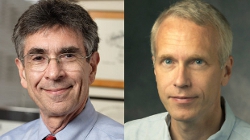 WIKIMEDIA, POCO A POCOPolitics commanded much of the national attention in the United States this year. The 2012 election was termed “the most important election of my lifetime” by more than one commentator. Scientists, too, seemed to place enormous weight upon the race between President Barrack Obama and his Republican rival Mitt Romney. Learned societies, science advocacy organizations, politicians, and independent researchers voiced their opinions about the value of scientific research and their visions for future science policy going forward, at the national, state, and local levels. And the worlds of science and politics collided in other countries as well. Here’s a review of the politics-and-science stories that caught the public’s—and The Scientist’s—attention this year.
WIKIMEDIA, POCO A POCOPolitics commanded much of the national attention in the United States this year. The 2012 election was termed “the most important election of my lifetime” by more than one commentator. Scientists, too, seemed to place enormous weight upon the race between President Barrack Obama and his Republican rival Mitt Romney. Learned societies, science advocacy organizations, politicians, and independent researchers voiced their opinions about the value of scientific research and their visions for future science policy going forward, at the national, state, and local levels. And the worlds of science and politics collided in other countries as well. Here’s a review of the politics-and-science stories that caught the public’s—and The Scientist’s—attention this year.
 Lefkowitz and Kobilka joined team Obama along with dozens of their cohort.COURTESY OF HHMI AND STANFORDBy and large, the scientific community seemed to rally around Barrack Obama in his successful campaign for a second term as President of the United States. But no more august Obama backers emerged than a group of more than 5 dozen Nobel Laureates. Sixty-eight Nobel Prize winners—including Robert Lefkowitz and Brian Kobilka, who took home this year’s chemistry prize for their work on the G-protein receptor—signed their names to an open letter supporting the president and his budgetary stance on funding science at the federal level.
Lefkowitz and Kobilka joined team Obama along with dozens of their cohort.COURTESY OF HHMI AND STANFORDBy and large, the scientific community seemed to rally around Barrack Obama in his successful campaign for a second term as President of the United States. But no more august Obama backers emerged than a group of more than 5 dozen Nobel Laureates. Sixty-eight Nobel Prize winners—including Robert Lefkowitz and Brian Kobilka, who took home this year’s chemistry prize for their work on the G-protein receptor—signed their names to an open letter supporting the president and his budgetary stance on funding science at the federal level.
Though the three, nationally televised debates leading up to the presidential election contained lively exchanges between Obama and Romney, not a word about climate change was breathed. Much to the dismay of environmental groups and science advocacy organizations, a discussion of climate change and the need for government to address mounting problems was completely absent from presidential debates for the first time in a generation. “Given that climate change may be the greatest challenge we face in the decades ahead, to be silent on the issue over the course of four debates does a real disservice to the country,” climatologist ...














